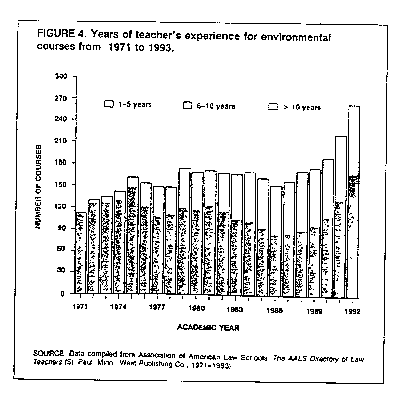
130
that he had not received any calls asking for assistance.
260 8. The growth of specialized environmental programs in law schools also has increased the comfort level
of many professors by making them less concerned about coverage tradeoffs. John Dwyer of the University
of California at Berkeley's law school, Boalt Hall, states that his school's extensive environmental program
265 means that «there is little pressure for coverage' in a basic environmental law course and greater freedom to
teach concepts and ideas». William Funk of the Northwestern School of Law of Lewis & dark College
explains that, at a school with a substantial environmental program, «no one course (or professor) has to
270 feel responsible for covering the whole area or deciding what substantively or methodologically to leave
out».
9.Many professors take comfort in the growing importance of the discipline, and some express the
275 sense of mission. Zygmunt Plater says that environmental law «is a course that must be taught-it's critically
important for the survival of our species». Here, the «legal system is doing the work of the angels», and
professors must «teach students how to make our society work — to find solutions to truly difficult prob
280 lems». Mare Poirer of Seton Hall University finds existential ground for inspiration. While conceding that
the «underlying pollution and resourse management problems may well be intractable», he notes that
because, «in the long run, life is sort of hopeless anyway,... one can appreciate the interesting details and
find inspiration in the midst of all chaos».
III The Impacts of Specialization
285 l.The explosive growth of the market for environmental lawyers appears to be eroding legal education's
traditional resistance to specialization. As a result, many law schools are creating what Michael Baram
290 of Boston University describes as «essentially mini law schools» focusing on environmental courses.
Baram believes that this is a logical response to the fact that environmental law has become such an
«unwieldy field» and that it will permit schools to «begin to rationalize what we're doing in the field». As
295 legal education comes under increasing fire for being too divorced from developments in the legal
profession the changes undertaken by law schools in response to environmental concerns will be greeted by
many as a refreshing step forward.
2.Not everyone, however, is convinced that increased spe cialization in the law school curriculum is
300 desirable. While recognizing that law school graduates who go into the environmental field «will face an
enormous early challenge», John Costonis of Vanderbilt believes that it is possible to produce «first-rate
lawyers who can deal with any problem environmental or whatever» — with out having a specialized

